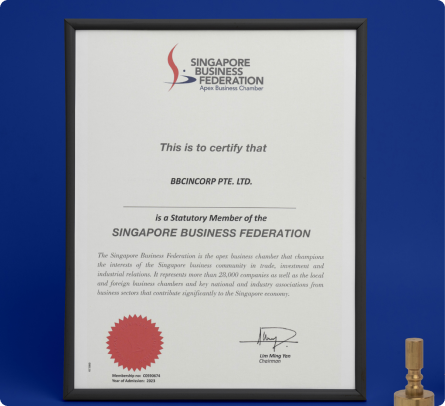Your Financial Success, Our Priority
Explore what makes us stand out.

Accountant on your side

Easy compliance

Accurate bookkeeping

Easy-to-use software
What's included in our accounting services
From tax filings, mail handling, to annual meeting preparations, we handle it all. Rest assured that your company's compliance is in capable hands.
Accounting solutions
Bookkeeping
Annual tax filing
Statutory account compliance
- Accounting solutionsBBCIncorp provides cloud-based accounting solutions through Xero, giving you real-time financial visibility and secure access to your business accounts anytime, anywhere.
- BookkeepingOur team prepares accurate management accounts, including Balance Sheets, Profit and Loss statements, and General Ledgers, helping you stay compliant with relevant laws.
- Annual tax filingWe handle the full tax filing process, from preparing tax computations and ECI submissions to filing Form C/C-S, so that your company meets all IRAS requirements on time.
- Statutory account complianceOur experts prepare unaudited financial statements, such as statements of financial position, profit or loss, cash flows, changes in equity, and detailed notes for your documents.

Accounting & Bookkeeping services pricing package
Take a closer look to discover the ideal fit for your company.
Customize your package
Choose your revenue and transaction
thresholds to view personalized pricing
US$990
/Year
Yearly revenue
Yearly revenue
Yearly transaction
Yearly transaction
Did you know?
BBCIncorp is a Gold Partner of Xero
We enhance global accounting services through innovative cloud-based solutions


Additional support
you may need
Whether it's payroll management, personal tax filing, or GST registration,
we've got you covered.
Dormant Company Accounting
Dormant Package
Types of Singapore business we support

Startups
We provide flexible, cost-effective accounting solutions for Singapore startups. Stay compliant from day one while keeping accounting and bookkeeping expenses under control.

SMEs
For growing businesses, we offer structured accounting services to manage daily finances, meet filing deadlines, and maintain accurate records. Our scalable solutions evolve as your business grows.

Global corporations
Our accounting packages combine compliance and advanced reporting with the convenience of an integrated online global platform. Manage financial processes securely from anywhere, anytime.
How your journey goes with BBCIncorp
From the first service request to ongoing support, we take care of the paperwork and filing processes so your Singapore business remains compliant with ease.
Reach out to BBCIncorp
Kindly share your business needs with us at our email address. Our team will carefully review the requirements and prepare a customized quotation based on your request.
Secure payment
Once you confirm the quotation, payment can be made through multiple channels, including International Wire, local bank transfer, debit, or credit card. See our payment guidelines.
Report preparation
Upon receipt of payment, our accountants shall prepare detailed reports based on your financial data. Draft reports are then provided to clients for review.
Filing with authorities
Once finalized, we will assist you in submitting the accurate documents to the relevant authorities in Singapore, ensuring full compliance with statutory requirements.
Confirmation and ongoing support
You will receive the official outcome by email once the filing is completed. Our commitment continues beyond this stage, as we remain available to provide expert guidance for you.
Switch to BBCIncorp accounting services today
Transitioning to BBCIncorp is simple and seamless. Make the move today and experience reliable accounting support dedicated to your business.

Required Documents
Required Documents

Need more help to your Singapore accounting plan?
Meet BBCIncorp solution partners
BBCIncorp collaborates with trusted solution partners, such as Xero, TaxHub, BAccount, and SunValue to streamline business accounting. Together, we deliver reliable, technology-driven solutions that enhance compliance, accuracy, and efficiency through proven expertise.

Xero
Xero offers intuitive accounting software to empower businesses of all sizes with seamless invoicing, expense tracking, and real-time finance insights.

Taxhub
Get an exclusive 10% discount on your accounting needs with Taxhub. Plus, enjoy a free 30-minute consultation with a CPA for personalized financial advice.

BAccount
BAccount provides intelligent and dependable accounting solutions, tackling business challenges in bookkeeping, financial reporting, tax compliance, and auditing.

SunValue
SunValue is a leading provider of comprehensive valuation services, delivering expert solutions that support diverse financial and business needs worldwide.
Hear From Our Customers
Awards & recognition
Our efforts to redefine business support have earned us recognition from industry leaders.
Frequently Asked Questions
Browse the list of questions below to find what you are looking for.
When should businesses in Singapore use accounting services?
Businesses in Singapore should use accounting services as soon as they complete their company incorporation, as accurate financial management is essential to meet ACRA and IRAS requirements.
BBCIncorp provides expert accounting services covering bookkeeping, financial statement preparation, and tax filing for your business. We also offer comprehensive Singapore company setup packages with accounting included. Contact our team for more details.
What is typically included in accounting services for a small business in Singapore?
A comprehensive accounting service package for small businesses in Singapore usually includes:
- Accounting software to record and manage daily financial transactions
- Bookkeeping to maintain accurate and up-to-date financial records
- Annual tax filing to ensure timely submission and compliance with IRAS requirements
- Statutory accounts compliance to prepare financial statements in line with ACRA regulations
We offer accounting packages to support SMEs in meeting all these obligations efficiently while maintaining compliance with ease.
What benefits do outsourced accounting services bring to businesses?
Outsourced accounting services help businesses save time, reduce costs, and maintain compliance without hiring full-time staff. Professional accountants handle bookkeeping, reporting, and tax filing accurately, minimizing errors and penalties. You will also gain access to expert advice, up-to-date knowledge of Singapore’s accounting and tax regulations, and valuable insights for strategic decision-making.
BBCIncorp’s accounting services deliver flexibility, efficiency, and peace of mind for businesses of all sizes in Singapore.
Do I have to file annual returns for my Singapore company?
In Singapore, it is mandatory for a company to complete annual return filing with the Accounting and Corporate Regulatory Authority (ACRA), and annual tax returns with the Inland Revenue Authority of Singapore (IRAS).
Can a BBCIncorp accountant be my business's company secretary?
Yes, you can appoint BBCIncorp to handle both roles for your business. We offer integrated accounting and company secretary services to help you manage compliance efficiently and accurately. By engaging both services with us, you will benefit from consistent communication, better coordination, and timely reporting.
What accounting standards are used in Singapore?
Singapore adopts the Singapore Financial Reporting Standards (SFRS), which are based on the International Financial Reporting Standards (IFRS) issued by the International Accounting Standards Board (IASB).
In addition, all companies incorporated in Singapore must prepare their financial statements in accordance with SFRS, unless they qualify for and choose to apply the simplified SFRS for Small Entities.
What is the difference between an in-house and an outsourced accountant?
An in-house accountant is a direct employee of the company who manages all accounting and financial reporting functions internally. They provide consistent, dedicated support but incur higher fixed costs, including salary, CPF contributions, and employee benefits.
On the other hand, an outsourced accountant refers to an external professional or accounting firm engaged to perform these functions. This model is generally more cost-efficient for startups and small to medium-sized enterprises, offering access to experienced specialists, flexible service arrangements, and professional oversight without long-term financial commitments.
Which taxes must a company in Singapore pay annually?
A Singapore company is basically taxed for its profits, regardless of the sources. For the first three years, the company is levied from 0% to 17% depending on its incomes. After that, the tax rates are 8.5% and 17%, respectively for the first 300,000 SGD and the remainder.
How does the tax system work in Singapore?
The tax system in Singapore is progressive, meaning that tax rates increase as income increases. The highest marginal tax rate is 22%, which applies to taxable personal income over SG$320,000. There are also a number of taxes levied on businesses, including corporate income tax, Goods and Services tax (GST), and property tax Singapore.
Companies, regardless of their domicile status, that conduct income-generating activities in Singapore will be subject to a flat corporate tax rate of 17%. Qualifying start-ups can receive either a partial exemption or a 3-year exemption.
Can you transfer from one service provider to BBCIncorp for corporate secretary services?
Yes, you have the option to switch your Singapore corporate secretary service provider to BBCIncorp.
Here's how you can do it:
- Begin by contacting our dedicated support team for assistance
- Once you've completed the service order with us, inform your current service provider of your intention to terminate the existing agreement
- Transfer the necessary company records to BBCIncorp
We will then appoint a new corporate secretary for your business within 60 days.
How many years do we need to keep accounting records in Singapore?
Generally, businesses are required to keep accounting records for a minimum of five years. However, there may be specific requirements for certain types of businesses, such as those in the financial sector.
How do I file taxes in Singapore?
Individual taxpayers can pay income tax in a variety of ways: GIRO, one-time payment, or 12-month interest-free installments. As for payment methods, you can either use internet/phone banking, SAM or NETS at a post office.
Paying corporate tax generally begins by filing the Estimated Chargeable Income (ECI) form with IRAS and ends with you paying the finalized corporate tax. We also offer tax filing services in Singapore should you want to expedite this process.
When is the deadline for filing taxes in Singapore?
The deadline for filing your income tax return is April 15th for paper filing and April 18th for e-filing. If you're an employer, the deadline for filing your employees' taxes is March 15th.
What should I look for when choosing an accountant?
When choosing an accountant, it's important to consider factors such as their qualifications, experience, and areas of expertise. You should also make sure that they're registered with the Accounting and Corporate Regulatory Authority (ACRA) and that they have a valid practicing certificate.
Can I get a refund if I overpaid my taxes in Singapore?
What is the Singapore Standard on Auditing?
What is the audit process in Singapore?
The audit process in Singapore generally consists of four main steps: planning the audit, performing the audit, reporting on the results, and follow-up. Planning the audit involves risk assessment and developing an audit strategy.
Performing the audit involves collecting and reviewing evidence to assess whether the financial statements are accurate. Reporting on the results involves issuing an opinion on the financial statements. Follow-up involves monitoring management's implementation of recommendations from the audit.
However, all of this doesn’t apply if you qualify for audit exemption under the state’s provisions.

























